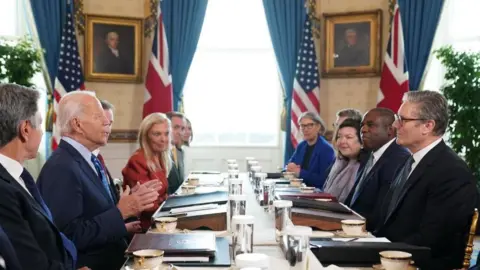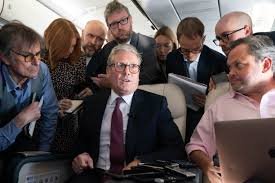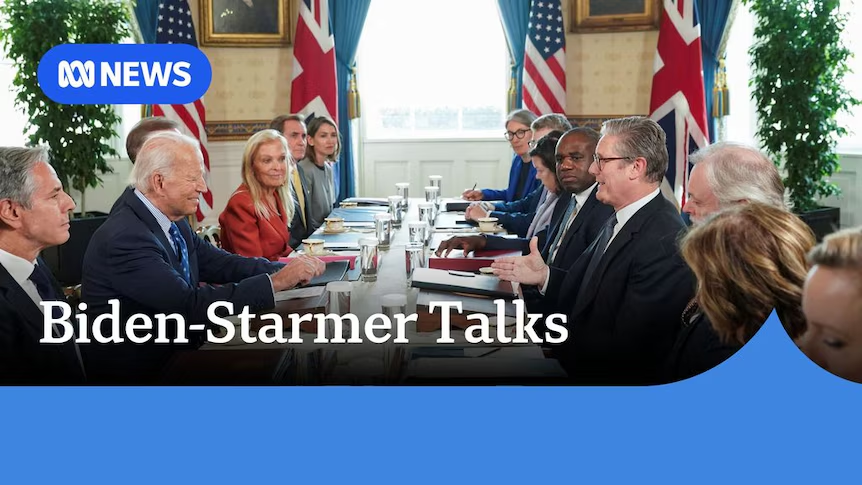In the recent high-profile meeting between UK Prime Minister Sir Keir Starmer and US President Joe Biden, the two leaders discussed in detail the ongoing conflict in Ukraine. Despite the productive nature of their conversation, none of the leaders made any new commitments regarding Ukraine’s request to use long-range missiles against Russian targets.
Key points of the meeting
The discussions held at the White House focused mainly on overall strategies rather than specific actions or tactics. Sir Keir Starmer emphasized that the conversation was about shaping a comprehensive approach to the situation in Ukraine. The White House reiterated this sentiment, saying that the leaders also expressed serious concern about Iran and North Korea supplying lethal weapons to Russia.

Ukraine appeals for advanced weapons
Ukrainian President Volodymyr Zelenskyy had recently highlighted the urgent need for advanced air defense systems and long-range missiles. According to Zelenskyy, more than 70 Iranian-made drones were launched by Russia overnight on Ukrainian territory. He emphasised that these weapons were vital to the defence of Ukrainian lives and infrastructure.
The request for long-range missiles is part of a wider appeal made by Ukraine’s leaders to their Western allies. They believe that having the ability to strike deep into Russian territory could significantly improve their defensive capabilities and put pressure on Russia for peace talks.

Reactions to Russian warnings
Prior to the Starmer-Biden talks, Russian President Vladimir Putin had issued a stern warning against the provision of long-range missiles to Ukraine. Putin argued that such a move would signal direct NATO involvement in the conflict, which he claimed would only worsen the situation.
In response to these warnings, former UK Defence Secretary Sir Ben Wallace expressed his disappointment, suggesting that the ongoing debate over these weapons was only benefiting the Russian President by withholding Western support for Ukraine. He argued that NATO should not be deterred by Putin’s threats and should consider providing Ukraine with the necessary military capabilities.
Views of US officials
Former US Special Representative for Ukraine negotiations Kurt Volker explained that Putin’s threats were designed to intimidate the West so that they would stop further support for Ukraine. Volker argued that the focus on avoiding provocations may be exaggerated and that the West should not be overly cautious about crossing so-called red lines.
US President Biden downplayed the impact of Putin’s statements while addressing the media ahead of his meeting with Starmer. Biden remarked that he did not regard Putin’s comments as a major concern, instead focusing on the strategic implications of the conflict and the broader international response.
Current status of military assistance
To date, both the US and the UK have been cautious about authorising the use of long-range missiles by Ukraine, fearing that such actions could further escalate the conflict. While Ukraine has received a variety of military aid, including long-range missiles earlier this year, their use has been restricted to avoid targets deep within Russia.
The UK has previously said Ukraine has the right to use UK-provided weapons for self-defence, but this does not extend to the use of long-range Storm Shadow missiles beyond Ukraine’s internationally recognised borders. Similarly, the US has provided long-range missiles but has not permitted their use on Russian targets away from the frontlines.
Wider implications and diplomatic context
The meeting between Starmer and Biden also discussed other global issues, including the ongoing Israel-Gaza conflict and various international concerns. The two leaders plan to pursue these matters at the upcoming UN General Assembly.

The diplomatic climate surrounding the Ukraine conflict remains tense, with significant geopolitical consequences. Relations have been further complicated by Russia’s expulsion of six British diplomats, citing allegations of espionage. The UK Foreign Office has rejected these claims as baseless.
In response to US sanctions against the Russian media channel RT, which is accused of being a tool for Russian intelligence, the Russian government has criticised these measures. RT’s editor-in-chief Margarita Simonyan has defended the network, while Russia’s Foreign Ministry has suggested that the US is over-emphasising the role of sanctions in its broader strategy.
Looking ahead
Ongoing negotiations between Western allies and Ukraine remain a key aspect of the international response to the conflict. As discussions progress, attention remains focused on balancing support for Ukraine and managing the risks of escalating tensions with Russia.
The international community is closely monitoring the situation as it evolves, with the hope that diplomatic efforts will help to stop the spread of the conflict.
